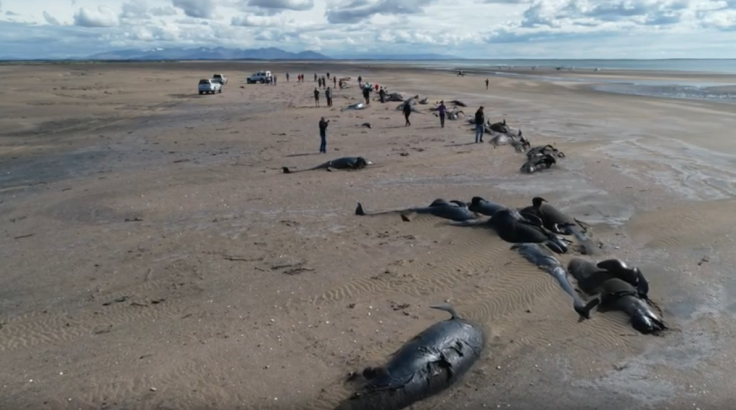
In the past few years, several incidents related to the death of marine animals were reported. Some of them died due to climate change, some died after consuming tons of plastic waste. But recently a mysterious event happened when tourists on a helicopter spotted dozens of dead whales on a remote beach of Iceland.
The pilot of the Reykjavik Helicopters David Schwarzhans stated that he and his passengers found 50 long-finned pilot whales on the beach of Snaefellsnes Peninsula in western Iceland last week and mentioned that the number could be higher since some of these marine animals were buried in the sand. But none of the witnesses had an idea about how these whales came to the shore.
Later reports claimed that these whales swam ashore at the same time and then died due to dehydration. Soon after the finding of a huge number of dead whales, the Iceland Monitor approached expert and marine biologist Edda Elisabet Magnusdottir who said that these pilot whales have a tendency to enter shallow waters 'and become disorientated'.
As per the local media reports, this is Iceland's second-largest mass stranding of the past 40 years. The first and the biggest mass stranding happened in 1987 when 148 pilot whales died at Þorlákshöfn and then in 1983 when 30 pilot whales similarly died at the Rif on Snaefellsnes.
Edda, who is a marine biologist at the University of Iceland specializing in whales, said, "This is the third year in a row at least where we've had pilot whales coming dangerously close to the shore. In this instance, they stranded."
It should be noted that experts still don't have any clear idea about why pilot whales strand, but there are several hypotheses. These type of whales are named like this because they follow a lead animal, usually a matriarch.
As per Edda pilot whales are very social animals and if their leader goes into an inconvenient area or get hurt somehow, the group of whales also follow that.
Róbert Arnar Stefánsson, a biologist and director of West Iceland Nature Research Centre told
The Reykjavík Grapevine: "Sometimes, [mass stranding] is due to human impact, offshore drilling or military exercises," adding that "There are also hypotheses regarding Persistent Organic Pollutants (POPs) because they bioaccumulate and are in their highest concentration in the oldest animals."
Those animals are sometimes the leaders and POPs can cause nerve damage. In some cases, that could be the reason."









